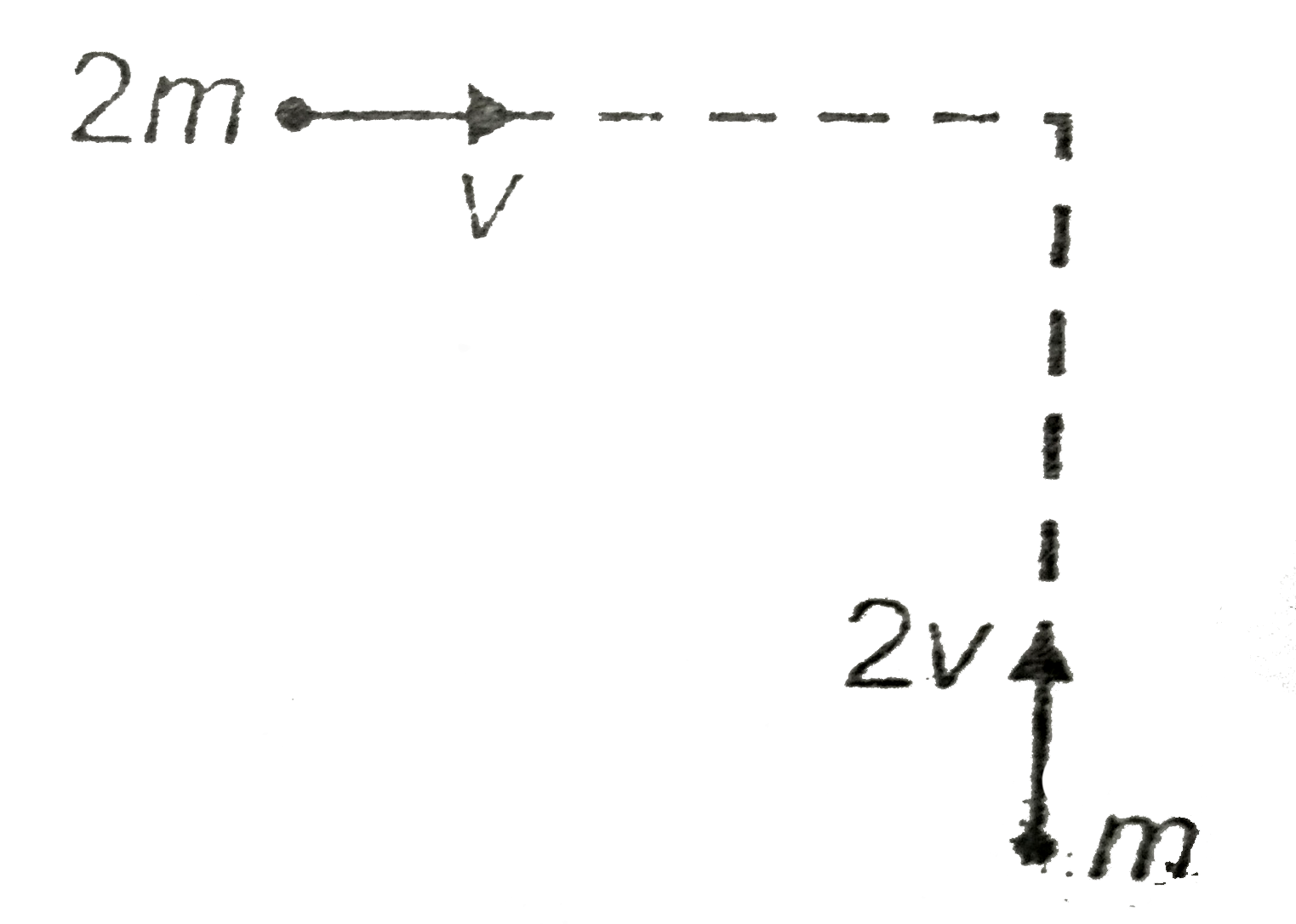Two particles of same mass 'm' moving with velocities →v1=vˆi,and→v2=(v2)ˆi+(v2)ˆjcollide in-elastically. Find the loss in kinetic energy
√23mu2
34mu2
13mu2
18mu2
The correct Answer is:4
To find the loss in kinetic energy during the inelastic collision of two particles of the same mass 'm', we can follow these steps:
Step 1: Determine the initial velocities of the particles
The velocities of the two particles are given as:
- →v1=v^i
- →v2=v2^i+v2^j
Step 2: Calculate the initial kinetic energy
The initial kinetic energy (KE_initial) of the system can be calculated using the formula:
KEinitial=12mv21+12mv22
Substituting the values:
KEinitial=12mv2+12m(v2)2+12m(v2)2
Calculating v22:
v22=(v2)2+(v2)2=v24+v24=v22
Thus,
KEinitial=12mv2+12m⋅v22=12mv2+14mv2=34mv2
Step 3: Calculate the final velocity after the collision
In an inelastic collision, the two particles stick together and move with a common velocity →v0. Using conservation of momentum:
m→v1+m→v2=(m+m)→v0
→v0=→v1+→v22
Substituting the values:
→v0=v^i+(v2^i+v2^j)2=(v+v2)^i+v2^j2=3v2^i+v2^j2=3v4^i+v4^j
Step 4: Calculate the final kinetic energy
The final kinetic energy (KE_final) of the combined mass is:
KEfinal=12(2m)v20
Calculating v20:
v20=(3v4)2+(v4)2=9v216+v216=10v216=5v28
Thus,
KEfinal=mv20=m⋅5v28=58mv2
Step 5: Calculate the loss in kinetic energy
The loss in kinetic energy is given by:
Loss in KE=KEinitial−KEfinal=34mv2−58mv2
Converting 34 to eighths:
34=68
Thus,
Loss in KE=68mv2−58mv2=18mv2
Final Answer
The loss in kinetic energy during the inelastic collision is:
Loss in KE=18mv2
The velocities of the two particles are given as:
- →v1=v^i
- →v2=v2^i+v2^j
The initial kinetic energy (KE_initial) of the system can be calculated using the formula:
KEinitial=12mv21+12mv22
Substituting the values:
KEinitial=12mv2+12m(v2)2+12m(v2)2
Calculating v22:
v22=(v2)2+(v2)2=v24+v24=v22
Thus,
KEinitial=12mv2+12m⋅v22=12mv2+14mv2=34mv2
In an inelastic collision, the two particles stick together and move with a common velocity →v0. Using conservation of momentum:
m→v1+m→v2=(m+m)→v0
→v0=→v1+→v22
Substituting the values:
→v0=v^i+(v2^i+v2^j)2=(v+v2)^i+v2^j2=3v2^i+v2^j2=3v4^i+v4^j
The final kinetic energy (KE_final) of the combined mass is:
KEfinal=12(2m)v20
Calculating v20:
v20=(3v4)2+(v4)2=9v216+v216=10v216=5v28
Thus,
KEfinal=mv20=m⋅5v28=58mv2
The loss in kinetic energy is given by:
Loss in KE=KEinitial−KEfinal=34mv2−58mv2
Converting 34 to eighths:
34=68
Thus,
Loss in KE=68mv2−58mv2=18mv2
The loss in kinetic energy during the inelastic collision is:
Loss in KE=18mv2
Topper's Solved these Questions
Similar Questions
Two particles of mass m & 2m have velocities uˆj & uˆi respectively . They collide completely inelastically. Find the loss in kinetic energy of the system.
View SolutionTwo particles of mass m & 2m have velocities uˆj & uˆi respectively . They collide completely inelastically. Find the loss in kinetic energy of the system.
View Solution
Knowledge Check
A particle of mass 1 g moving with a velocity →v1=3ˆi−2ˆjms−1 experiences a perfectly in elastic collision with another particle of mass 2 g and velocity →v2=4ˆj−6ˆkms−1. The velocity of the particle is
A2.3ms−1B4.6ms−1C9.2ms−1D6ms−1
Two particles of same mass m moving with velocities u1 and u2 collide perfectly inelastically. The loss of energy would be :
View SolutionTwo particles of equal mass m are moving with velocities vˆi and v(ˆi+ˆj2) respectively. If the particles collide completely inelastically, then the energy lost in the process is
View SolutionTwo particles of mass 2m and m moving with speed v and 2v respectively pependicular to each other collides perfectly inelastically, then

Find the angle with the horizontal to which the particles move after collision.
View SolutionA particle of mass m1 moving with velocity v in a positive direction collides elastically with a mass m2 moving in opposite direction also at velocity v. If m2>>m1, then
View SolutionA particle of mass m moving with speed u collides perfectly inelastically with another particle of mass 2m at rest. Find loss of kinetic energy of system in the collision.
View SolutionA particle of mass m moving with speed u collides perfectly inelastically with another particle of mass 2m at rest. Find loss of kinetic energy of system in the collision.
View SolutionTwo particles having position verctors →r1=(3ˆi+5ˆj) metres and →r2=(−5ˆi−3ˆj) metres are moving with velocities →v1=(4ˆi+3ˆj)m/sand→v2=(αˆi+7ˆj)m/s. If they collide after 2 seconds, the value of α is
View Solution
